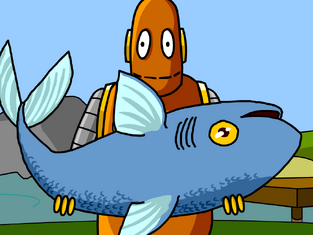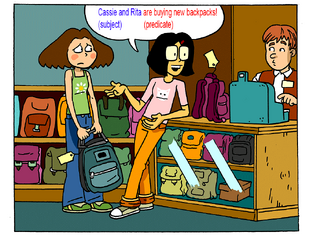| Subject and Predicate | |||
|---|---|---|---|
 | |||
| Airdate | April 30, 2002 | ||
| Curriculum | English | ||
Subject and Predicate is a BrainPOP English video launched on April 30, 2002.
Summary[]
Moby keeps putting the fish in Tim's room!!! When will Tim explain subject and predicate?
Appearances[]
Transcript[]
Quiz[]
- Subject and Predicate/Quiz
FYI's[]
Arts and Entertainment[]

One of the most important characters in the Star Wars universe is Yoda, the 900-year-old green Jedi master. Voiced by puppeteer Frank Oz (who also voiced Miss Piggy, Fozzie Bear, and several other Muppets), Yoda made his first appearance in 1980’s Episode V: The Empire Strikes Back and had featured roles in every subsequent Star Wars movie.
If you’re a fan, you know that Yoda has a very specific way of speaking. He says things like, “Begun, the Clone Wars have” instead of “The Clone Wars have begun” and “This one a long time have I watched” instead of “I have watched this one for a long time.” Other examples include, “Dangerous and disturbing this puzzle is,” and, “Much to learn, you still have.”
You might think that Yoda has poor grammar. However, his grammar is actually perfect—he simply changes the order of the clauses in each sentence. Every subject is matched with a predicate. It’s just that the order of the subjects and predicates is often reversed.
This trick wasn’t invented by George Lucas. Instead, it’s a centuries-old poetic device called anastrophe (pronounced “uh-NAH-stro-fee”). It was common in Ancient Greek and Latin poems, and was also popular in some English poetry written before the 20th century.
Basically, Yoda always places predicates at the ends of sentences. He also usually flips the order of the subject and object. That way, a simple sentence like, “When you reach 900 years old, you won’t look this good” becomes the exotic-sounding, “When 900 years old you reach, look this good you will not.”
In Depth[]

Linguists have identified a number of different types of predicates. Here’s a quick overview! Verb-only predicate: “Cassie smiled.”
Direct-object predicate: “Moby ate a hamburger.”
Indirect-object predicate, without a preposition: “Gary gave Rita the answer sheet.”
Prepositional object predicate: “Moby listened to the radio.”
Adverbial predicate: “Tim met Rita at the library.”
Predicate nominal (describes who someone is): “Gary is the smartest kid in school.”
Predicate adjective: “Moby is orange.”
Stage-level predicate (reflecting a temporary condition): “Moby is hungry.”
Individual-level predicate (reflecting a permanent attribute): “Moby is heavy.”
Collective predicate (for actions that can only be done by a group): “The customers formed a line.”
Theory[]

You may have noticed that babies rarely express themselves in complete sentences, with both subjects and predicates. Where you might say, “I’m hungry, Mom. May I have a chocolate chip cookie?” a baby might say something like, “Hungry!” or, “Cookie!” If the baby is younger than 3 months—that is, unable to form words—she might just point and say something like, “Maaaah.”
According to Priscilla Dunstan, a former opera singer from Australia, five very basic sounds actually make up a “language” that babies use to communicate their needs to their parents. Dunstan’s theory began growing in popularity after she appeared on the Oprah Winfrey Show in 2006, and she currently sells DVD sets in which she explains her “baby language” to parents.
Dunstan claims that babies make a sound like, “Neh” to say “I’m hungry,” and a sound like “Owh” to say “I’m sleepy.” “Heh” means “I’m experiencing discomfort;” “Eairh” means “I have gas;” and “Eh” means “I need to burp.”
Dunstan claims that each of these “sentences” comes from a baby’s natural reflexes—for example, “Owh” is a modified yawn, and “Neh” represents the suckling reflex.
However, Dunstan’s claims have never been scientifically tested, and they’re based entirely on evidence from Dunstan herself. So while her theory is certainly interesting, it hasn’t been proven.
Do It![]

Identify the subject and predicate of the following sentences.
1. Moby caught a large fish. (pictured)
2. Cassie and Rita both bought new backpacks.
3. Two chocolate mints rested on Cassie’s pillow.
4. Rita and Tim searched the library for books about sharks.
5. Fred’s dog listened closely for the sound of food being prepared.
6. The wind created ripples on the calm surface of the lake.
7. Moby was hungry for lunch, even though it was only 10 a.m.
Answers: 1) Subject: Moby; Predicate: caught; 2) Subject: Cassie and Rita; Predicate: bought; 3) Subject: two chocolate mints; Predicate: rested; 4) Subject: Rita and Tim; Predicate: searched; 5) Subject: Fred’s dog; Predicate: listened; 6) Subject: the wind; Predicate: created; 7) Subject: Moby; Predicate: was hungry
FYI Comic[]

